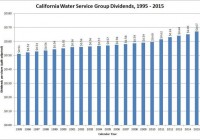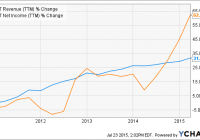Dividend Growth Stock Overview: Connecticut Water Service, Inc.
Summary CTWS provides water service to 123,000 customers in Connecticut and Maine. The water and wastewater utility segment provides over 90% of its income. The company has increased dividends since 1970. Over the last two decades, CTWS has grown its dividend at less than 2% annually. CTWS has a payout ratio of 55%, and the stock currently yields 3%. About Connecticut Water Service Connecticut Water Service, Inc. (NASDAQ: CTWS ) provides water utility services to over 123,000 customers across portions of Connecticut and Maine. The company employs 265 people and is headquartered in southeastern Connecticut. The company has 5 wholly owned subsidiaries, two of which cover Connecticut Water’s regulated utility business. The Connecticut Water Company and The Maine Water Company serve a population of about 400,000 people in their respective service areas. The Connecticut Water Company is the company’s original business, while The Maine Water Company was formerly Aqua America’s Aqua Maine subsidiary. The subsidiary was acquired at the beginning of 2012 for $35.6 million. Connecticut Water Services’ business is organized into three segments: Water Activities, Real Estate Transactions, and Services and Rentals. The Water Activities segment covers Connecticut Water’s regulated companies’ activities; the segment includes 2,100 miles of water mains, and a reservoir storage capacity of 9.4 billion gallons. The segment’s 239 active wells and 25 surface water sources is capable of supplying 176 million gallons per day. This segment provided 93% of Connecticut Water’s total net income in 2014. The Real Estate Transactions segment is responsible for disposing of Connecticut Water’s real estate holdings when they no longer serve the company’s needs. The company will sell or donate for income tax benefits the real estate holdings. This segment’s contribution to the total company’s net income is negligible; in 2014, this segment earned $50,000. The Services and Rentals segment provides contracted services to other water and wastewater utilities, like operating facilities under contract. This segment is also responsible for marketing and operating the optional service line protection program offered by Connecticut Water, which covers the cost of repairs to a broken water service line. At the end of 2014, 20,000 customers had signed up for the program in Connecticut and 2,000 had signed up in Maine. In general, this segment provides 7 – 10% of the company’s total net income; it was 7% in 2014. In 2014, Connecticut Water earned a total of $21.3 million on $94.0 million in revenues, numbers that were up 16.7% and 2.8%, respectively. The large increase in income was due an authorized increase in water rates and a reduction in income taxes. Earnings per share were up commensurately by 16.1% to $1.95. With the current annualized dividend of $1.07, the company’s current payout ratio is 54.9%. The company’s book value increased by 5% to $18.83 at the end of 2014. The company’s debt stayed flat year-over-year; the company has a debt-to-equity ratio of 84%. The company has authorized a stock repurchase program that allows for the purchase of up to 10% of the company’s total outstanding shares. The company has not purchased any shares under the program and stated in its 2014 10-K filing that it has no plans to do so. The company is a member of the Russell 2000 index and trades under the ticker symbol CTWS. Dividend and Stock Split History (click to enlarge) Connecticut Water Service has compounded dividends at about 2.7% since 2010. Connecticut Water has increased dividends since 1970. The company regularly announces increases in mid-August, with the stock going ex-dividend at the end of August. In August 2015, Connecticut Water announced a 3.9% increase in its dividend to an annualized rate of $1.07 per share. Connecticut Water should announce its 46th annual dividend increase in August 2016. Connecticut Water has grown its dividend extremely slowly over its history. For the last 20 years, the company has increased the year-over-year quarterly dividend by no more than a penny, resulting in a 5-year dividend growth rate of 2.68%. Longer term, the dividend growth rates are even slower, with 10-year and 20-year dividend growth rates of 2.20% and 1.72%, respectively. The company has split its stock twice, both times 3-for-2. The most recent stock split occurred in September 2001. Prior to that, Connecticut Water split its stock in September 1998. For each share purchased prior to September 1998, you would now have 2.25 shares of Connecticut Water stock. Over the 5 years ending on December 31, 2014, Connecticut Water Service stock appreciated at an annualized rate of 11.28%, from a split-adjusted $20.97 to $35.78. This underperformed the 13.0% compounded return of the S&P 500 and the 14.0% compounded return of the Russell 2000 Small Cap indices over the same period. Direct Purchase and Dividend Reinvestment Plans Connecticut Water Service has both direct purchase and dividend reinvestment plans. You must already be an investor in Connecticut Water Service to participate in the plans. The minimum amount for the direct purchase plan is $25. The dividend reinvestment plan allows for partial reinvestment of dividends. The plans’ fee structures are somewhat favorable for investors, with the company picking up all costs on stock purchases. However, when you sell your shares you’ll pay a sales commission of $15. In addition, if you withdraw from the dividend reinvestment plan completely, you will pay a termination fee of $35. All fees will be deducted from the stock sales proceeds. Helpful Links Connecticut Water Service’s Investor Relations Website Current quote and financial summary for Connecticut Water Service (finviz.com) Information on the direct purchase and dividend reinvestment plans for Connecticut Water Service Disclosure: I/we have no positions in any stocks mentioned, and no plans to initiate any positions within the next 72 hours. (More…) I wrote this article myself, and it expresses my own opinions. I am not receiving compensation for it. I have no business relationship with any company whose stock is mentioned in this article.

